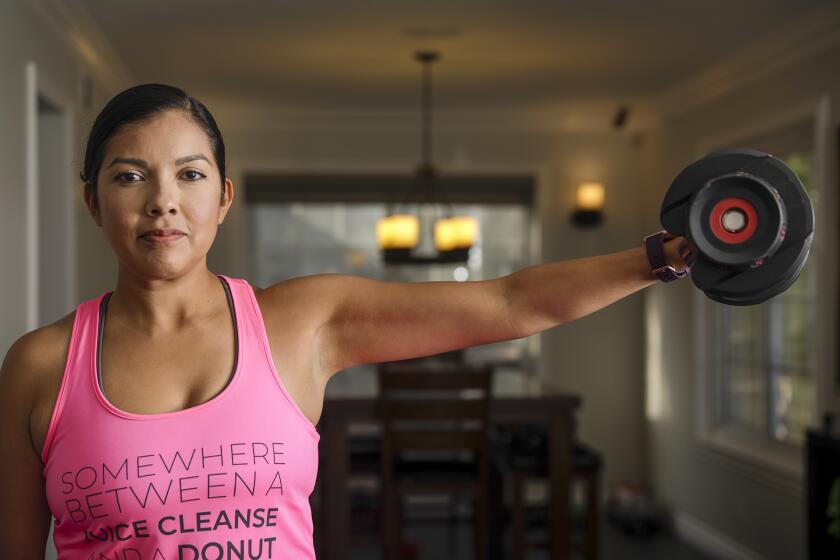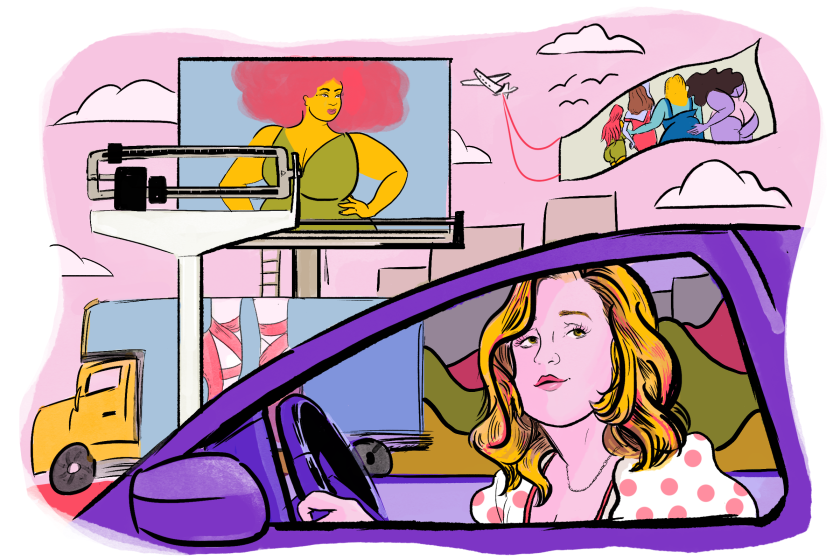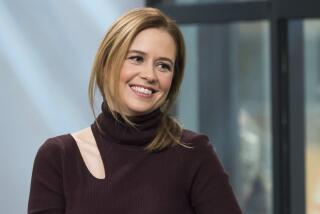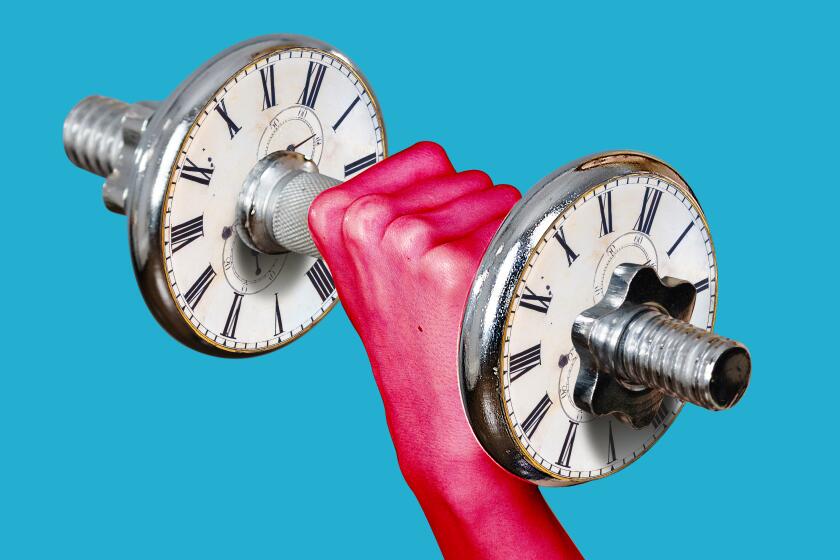What I learned from breast cancer can help you get through the pandemic
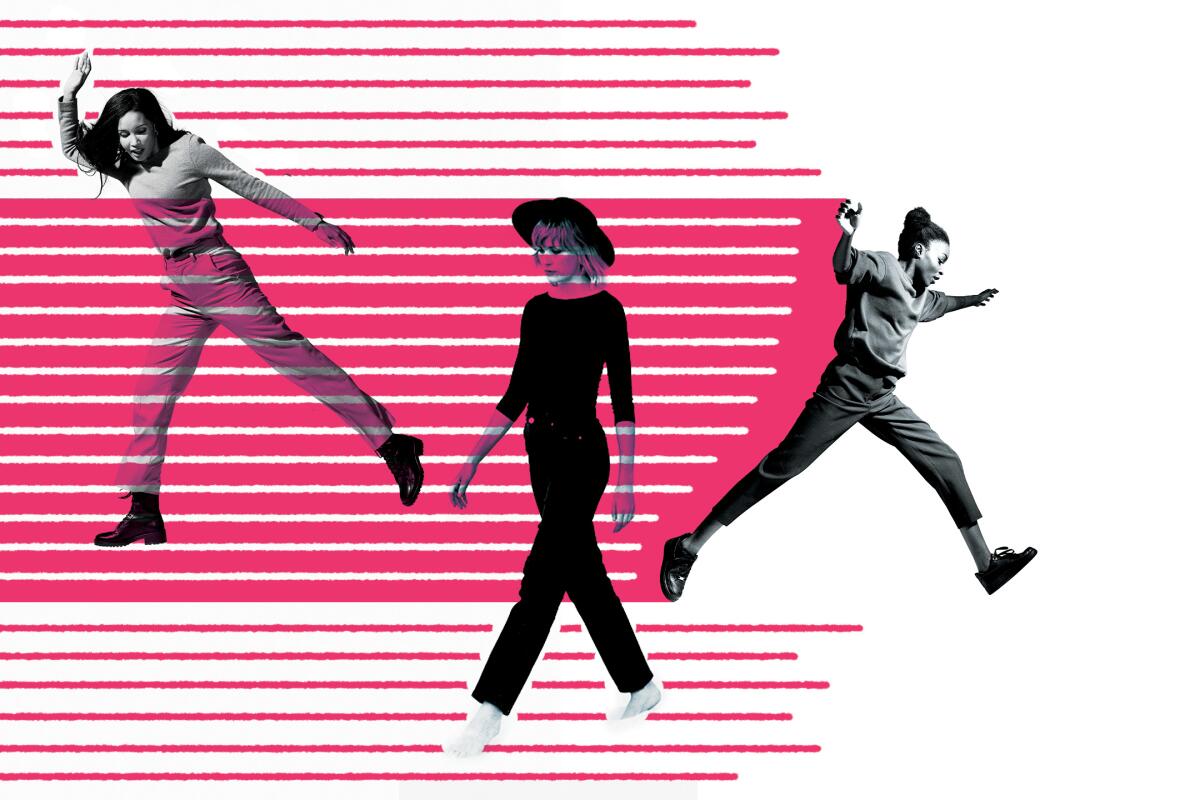
If there’s one moment I won’t soon forget, it was my surgeon telling me matter-of-factly that my right nipple might turn black and fall off after my five-hour mastectomy and reconstruction surgery.
As bad as that sounds, I think I took it pretty calmly, mostly because I was still dazed from the anesthesia and still numb from everything else that had happened since a routine mammogram a couple of months earlier led to a breast cancer diagnosis.
Thankfully that nipple didn’t fall off like an old pastie. But while I still looked like myself on the outside, inside things had dramatically changed, including my identity as a health and fitness journalist and my ideas about what constitutes good health.
Proponents of intermittent fasting say it’s a simple hack for curbing the endless snacking and nibbling and nighttime eating that can pack on calories.
After the diagnosis, I felt weak and vulnerable. I couldn’t remember the last time I felt that way. Getting a golf-ball-size tumor removed at the relatively early age of 49 felt more than a little ironic for this wellness writer who regularly dished out advice on how to stay strong and healthy. Beyond losing confidence in my health, did the diagnosis mean I’d just lost my credibility?
Before, I felt bulletproof just because I could crank out burpees during a grueling workout and actually enjoyed green smoothies.
Just months after my surgery, I found myself with a bionic boob, taking a hormone blocker and freaking out over every last twinge or cramp in my body, afraid that cancer cells might still be lurking somewhere.
Get The Wild newsletter.
The essential weekly guide to enjoying the outdoors in Southern California. Insider tips on the best of our beaches, trails, parks, deserts, forests and mountains.
You may occasionally receive promotional content from the Los Angeles Times.
Like many cancer survivors, I spent a lot of time trying to figure out “how I gave myself cancer.” What had I been doing wrong? I wasn’t overweight, didn’t have the BRCA gene mutation, wasn’t a smoker or heavy drinker and wasn’t over 55 — all the big risk factors for breast cancer.
Although I’ll never really know what let cancer in the door, the experience led me to dissect my so-called healthy lifestyle and figure out what was serving me and what wasn’t.
In the last year since my surgery and diagnosis, I’ve changed my sleep habits, examined my relationships, gotten smarter about when and how to push myself with exercise and, perhaps most important, worked on keeping my stress levels more in check through mindfulness, yoga and guided meditations.
When you’re the largest of the “straight sizes” and smallest of the “plus sizes,” it’s easy to think something’s wrong with you, even though this in-between, no-man’s-land is supposedly the average size of American females.
All have also helped ease the stress and anxiety of quarantine.
I’ve tried acupuncture, aromatherapy, ayurveda, plant-based meals, mocktails and sound baths and have become a dedicated intermittent faster once I learned that some believe it can be an important tool in the fight against cancer.
Fitness may not have kept cancer away, but I do believe it helped lessen its impact and certainly helped me recover from my surgeries more quickly — so quickly, in fact, that some people still don’t know I had cancer. To those people: Surprise!
Here are a few other wellness lessons from my cancer journey that I’d like others to know:
In 2014, Penn Jillette — the tall half of the popular Penn and Teller magic act — couldn’t walk up stairs and got winded speaking full sentences.
1. Listen to your body
Our culture encourages everyone to keep on pushing — through the pain, through the stress, even through illness. In the months before my diagnosis, I was significantly more fatigued at the end of the day and had a huge flare-up of inflammatory rosacea on my face. It was like my body had put up a pink neon sign saying, “Pay attention! Something’s wrong here!” But I just kept on trucking, chalking up the rosacea to the wrong skincare products and the stiffness on my right side to dense breast tissue.
2. Recognize the need for rest
Similarly, before my diagnosis, I didn’t really believe in “recovery” days, so I didn’t spare enough time for stretching when I exercised, as I was trying to squeeze in as much effort as I could in the time I had. That “hustle hard” mentality in exercise is dead to me now, as are one-size-fits-all fitness plans, restrictive diets and the industry-fueled notion that I need to constantly make my body “better.” I’m now taking the approach that my body is already a glorious temple that just needs a more thoughtful caretaker. While I’m still active in some way every day, I’ve taken the lead foot off the accelerator when it comes to my fitness routine. I still enjoy a bootcamp class but also appreciate yoga and Jazzercise. And guess what? I still wear the same size jeans as when I was constantly pushing myself. Go figure.
3. Find your tribe
Like most working parents, I often put my own needs for relaxation, fun and connection last. But when friends, family and even some people I liked but didn’t know all that well rallied to bring over meals, provide a ride or check in on me, it made me realize just how wide my circle was and how much more time I should spend nurturing it. I also made some great new friends in other cancer survivors through a wonderful organization, Pasadena-based Foundation for Living Beauty, a sisterhood where I could talk with other women about surgery and treatment and joke about its indignities without getting the accompanying “sympathetic head tilt,” as we called it, and the pitying looks that made me feel like one of the dogs in the Sarah McLachlan “In the Arms of the Angel” Humane Society commercials.
4. Accept help
I’ve always been a private, do-it-all-myself kind of person, and this experience made me realize how little this was serving me. I’m more open now (clearly, from all this talk about my nipple), and it’s helping me make more satisfying connections and reach out to others when I need to talk.
5. Eliminate stress
Many of us tend to take on too much, and when we finally do relax, we can’t stop worrying about what we’re not doing. I’m no exception, and with work deadlines and a child with special needs, my stress levels often ran incredibly high prior to my diagnosis. However, I know now that prolonged periods of worry and stress come at a real price to your health. If you can’t change what’s causing your stress, you have to learn to better unplug from it. Make a conscious decision to let things go, get out of your head, and refocus on what’s good and working in your life. Learning to be present in each moment and focusing on only what I can control, rather than planning, worrying or stewing, have been critical to my recovery.
6. Real strength is about resilience
I am beyond lucky that my cancer did not reach my lymph nodes and that the Oncotype test on my tumor gave me a low chance of recurrence, which made chemotherapy of little benefit. While there have been real side effects from medication — hello, mood swings and hot flashes — and at least one other surgery to cut my cancer risk further, not once in the last year did I consider myself a cancer “warrior.” That’s because my experience dealing with the disease, while painful and life-changing, did not require the same level of grit and toughness in me that it required in many of those I met with metastatic breast cancer and those enduring the fatigue, nausea and nerve pain from multiple round of chemotherapy. Forget the folks setting personal bests on the treadmills at Orangetheory; these women are the real badasses.
7. Create a fitness practice
Recovering from cancer has given me a broader perspective on health. I’ve shed my performance mindset and stopped caring so much about how many push-ups I can do. Instead I’m cultivating a fitness practice around resilience and longevity. These days, it’s all about staying in the game, moving and continuing to build strength and mobility in my body so I feel better, bounce back more quickly from setbacks and am harder to kill.
I might not be a warrior, but I am determined to be a survivor.
Melinda Fulmer is a Los Angeles-based health and fitness writer. She is on Twitter and Instagram @melindafulmer.
More to Read
Sign up for The Wild
We’ll help you find the best places to hike, bike and run, as well as the perfect silent spots for meditation and yoga.
You may occasionally receive promotional content from the Los Angeles Times.
